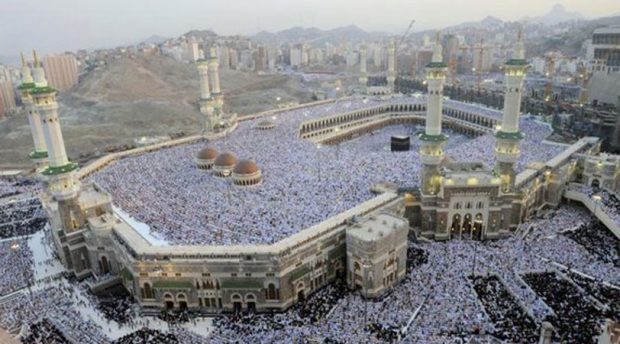
COVID-19: Hajj is on, but only a limited number of people will perform it

RIYADH: Saudi authorities said that Hajj, one of the five pillars of Islam, will be performed, but with only a limited number of people due to the spread of the coronavirus pandemic.
Speculations have mounted about whether Saudi Arabia would go ahead with Hajj, the pilgrimage that brings together more than 2.3 million people for six days in Makkah.
As part of the measures taken by Saudi Arabia to mitigate the spread of the coronavirus, mosques, including the Grand Mosque in Makkah and the Prophet’s Mosque in Madinah – the two most scared mosques for Muslims- were closed for some time.
The Grand Mosque and the Prophet’s Mosque were later opened, but only to a limited number of people – the imams and those working in them.
The same policy of limiting crowds will be applied for the pilgrimage and only a few Saudi citizens and foreigners living in Saudi Arabia will be allowed into Makkah for Hajj in the last days of July.
The Saudi authorities said the decision was taken as the virus has been spreading across more than 180 countries, affecting more than 7 million people and killing around 500,000.
They said they took into consideration the Saudi health ministry’s assessment, the reports of various countries and competent authorities, the lack of a vaccine or cure, the difficulty of imposing distancing measures in crowds and the country’s commitment to ensuring people’s safety.
The authorities added that the suspension of Umrah earlier was needed to protect people from contracting the disease through close contacts in Makkah.
However, as the pandemic continues across the world and the number of cases increasing, the authorities said they would apply very strict measures during the Hajj.
They said it would be open to all nationalities living in Saudi Arabia.
Foreigners make up more than one third of Saudi Arabia’s total population of 33 million.
The largest communities are Indians (3 million), Pakistanis (2.5 million), Egyptians (2.2 million), Yemenis (1.4 million) and Bangladeshis (1.2 million).
According to official figures, last year 2,371,675 people performed Hajj, including 1,758,722 who came from abroad and 612,953 who were either Saudi citizens or foreigners living in Saudi Arabia.
The figures showed that Asians (excluding Arab countries) constituted 59.7 % of the foreigners, followed by Arabs with 22.5%, Africans with 9.5 %, and Europeans with 5%.
Pilgrims from the Gulf Cooperation Council excluding Saudi Arabia (Bahrain, Kuwait, Oman, Qatar, and the United Arab Emirates) represented 1.9% of the total and from the Americas and Australia 1.4%.


